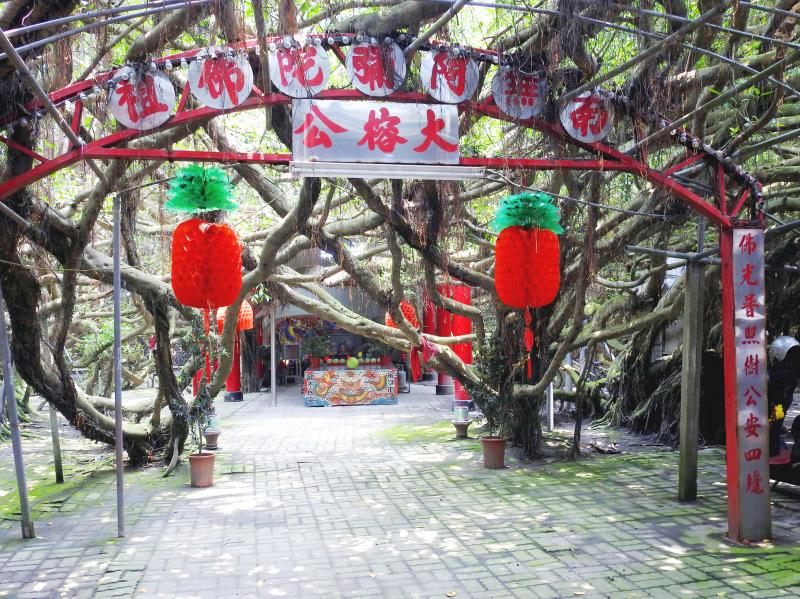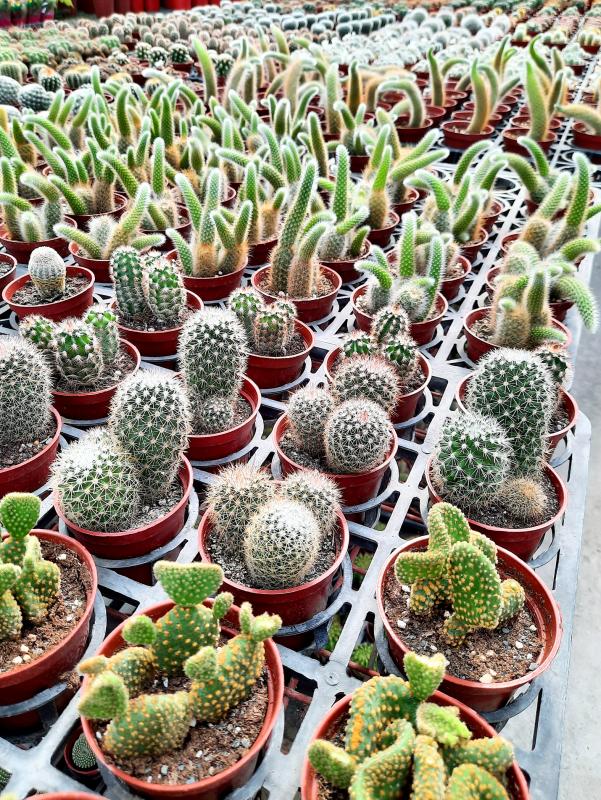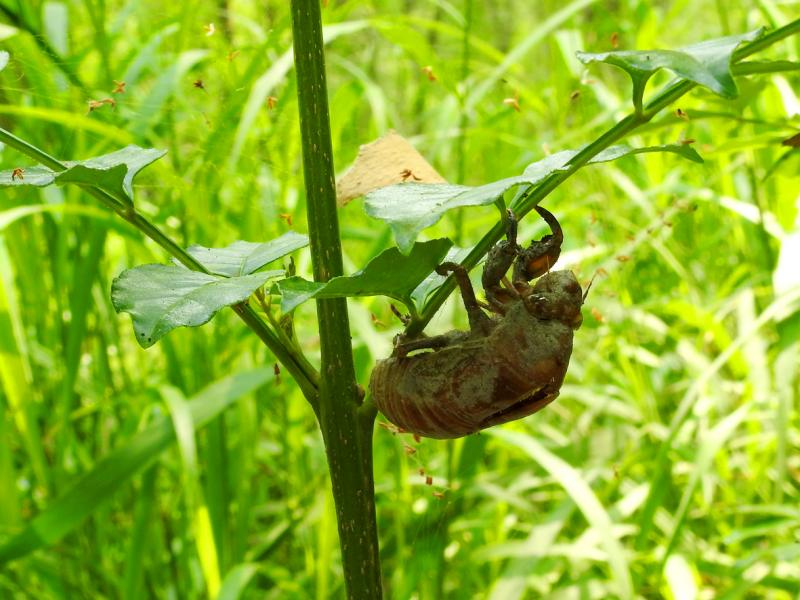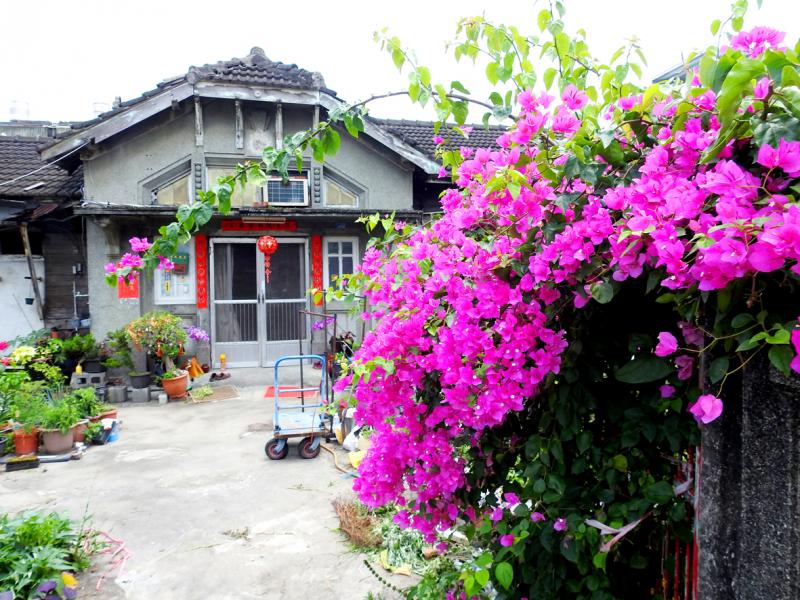Tourism is a lopsided industry in most countries, and Taiwan is no exception. On some days, certain places are packed out with visitors, while others hardly ever see an excursionist.
It’s probably true to say that tourism is even more uneven in Changhua County than in other counties or municipalities. Almost everyone has toured the famous temples and old streets of Lukang (鹿港), but how many readers of the Taipei Times have set foot in Jhutang (竹塘) or Sijhou (溪州), rural townships on the north bank of the Jhuoshuei River (濁水溪)?
Not many people live in Jhutang — fewer than 14,600 according to recent Household Registration data — and on the Sunday morning we visited, the only place that appeared at all lively was 4km southeast of the township’s modest downtown.

Photo: Steven Crook
SACRED BANYAN TREE
Clusters of retirees and middle-aged folks were relaxing beneath the boughs of Jiulong Giant Banyan (九龍大榕樹), an immense sacred tree that could be 300 years old.
Some visitors were picnicking. Two vendors were doing brisk business, and during our visit the karaoke machine didn’t once fall silent. There are basketball hoops and bathrooms.

Photo: Steven Crook
The banyan’s size (more than 3,000 ping, or over 1 hectare) and shape are in part a consequence of natural disasters. Typhoon gales have caused it to grow sideways rather than upward. The Aug. 7 floods of 1959 added a thick layer of fertile soil to the area, after which the tree’s canopy grew even larger.
Some of those living in the neighborhood reported spooky happenings in the months following that calamity. This, it was eventually decided, was because they hadn’t correctly handled the remains of Liao Jhu-che (廖竹車), a native of Jhushan (竹山) in Nantou County who perished in the flooding and was washed up near the banyan.
To rectify their errors, villagers established a small temple in Liao’s honor. It’s on the western edge of the canopy, and contains an unembellished stone tablet that bears the man’s name.

Photo: Steven Crook
The shrine dedicated to Lord Great Banyan (大榕公) is just as simple — but not nearly so gloomy, in the literal as well as figurative sense.
The banyan itself is quite a sight, and we spent a good while wandering between and beneath its branches, taking advantage of the marvelous light to snap photos.
There aren’t many signs to Jiulong Giant Banyan, but if you drive or ride a few hundred meters west of the high-speed railroad, close to the Jhuoshuei River, you should be able to find it.

Photo: Steven Crook
Purely by chance, exactly 1km from the banyan, we found one of Jhutang’s most appealing traditional homes, on Jhutian Lane (竹田巷) near Guangming Road (光明路).
According to Just A Balcony (justabalcony.blogspot.com), my Chinese-language go-to for information on obscure architectural treasures, the Tseng Family Old Residence (曾氏古厝) was built in Chinese-Fujianese style in 1929.
En route to Sijhou, we made another chance discovery. At 337 Silin Road (溪林路) in Pitou Township (埤頭), a semi-dilapidated building compelled me to park the car and take a few photos.
The current police station is right next door, so I immediately guessed I was looking at what had been a police outpost during the 1895-1945 period of Japanese colonial rule. On the Ministry of Culture Bureau of Cultural Heritage Web site, which lists this structure as a protected building, it’s called the Beidou District Crossroads Police Station (北斗郡路口厝派出所). No precise date of construction is given, but the Web site praises the former station’s “magnificence and elegance,” noting that it has the gable wall, roof and Japanese-style tile work that are typical of its era.
SIJHOU GARDENS FOREST ZONE
Sijhou Gardens Forest Zone (溪州公園森林區) is part of Taiwan’s largest park. What’s also called Changhua Fitzroy Gardens is a 123-hectare expanse of formal garden, plant nurseries and plantation forest.
None of the trees here are nearly as old, impressive or remarkable as Jiulong Giant Banyan, but there are lots of them. We arrived close to midday, and the sun was out, yet temperatures along the three well-shaded boardwalks (total length: 928m) were very tolerable.
Judging by the evidence littering the woodland, May is molting season for Sijhou’s cicadas. On several trees and plants, we found discarded exoskeletons.
It wasn’t a good time of day for birdwatching, yet I spotted several light-vented Bulbuls (a ubiquitous species known to Taiwanese as the “white-headed bulbul,” 白頭鵯). When I took a closer look at the irrigation canal on the southeastern edge of the forest zone, a couple of egrets took wing.
My wife is green-fingered, so any visit to Changhua County has to include a stop in Tianwei (田尾), a township famous for its horticultural attractions and businesses.
The center of action is Tianwei Highway Garden (田尾公路花園), where — in addition to more plants and flowers than you could count in a lifetime — there are places where you can rent bicycles, e-bikes and golf cart-type buggies big enough for a family. There are also plenty of eating options.
If you’re heading to Tianwei to buy gardening supplies, it pays to do a bit of research beforehand, as many businesses here specialize in one or two types of plant. My wife spent most of her time in a place renowned for its roses. I found the selection of colorful cacti next door more to my taste. There was a bonsai specialist across the street.
Even if you’ve no great interest in flowers, you’re sure to find something alluring or exotic. And as I strolled between rows of plants, it occurred to me that we can be sure of one thing: If Taiwan ever legalizes the cultivation of marijuana, Tianwei’s expert gardeners will be in the vanguard.
Steven Crook has been writing about travel, culture and business in Taiwan since 1996. He is the author of Taiwan: The Bradt Travel Guide and co-author of A Culinary History of Taipei: Beyond Pork and Ponlai.

Behind a car repair business on a nondescript Thai street are the cherished pets of a rising TikTok animal influencer: two lions and a 200-kilogram lion-tiger hybrid called “Big George.” Lion ownership is legal in Thailand, and Tharnuwarht Plengkemratch is an enthusiastic advocate, posting updates on his feline companions to nearly three million followers. “They’re playful and affectionate, just like dogs or cats,” he said from inside their cage complex at his home in the northern city of Chiang Mai. Thailand’s captive lion population has exploded in recent years, with nearly 500 registered in zoos, breeding farms, petting cafes and homes. Experts warn the

The unexpected collapse of the recall campaigns is being viewed through many lenses, most of them skewed and self-absorbed. The international media unsurprisingly focuses on what they perceive as the message that Taiwanese voters were sending in the failure of the mass recall, especially to China, the US and to friendly Western nations. This made some sense prior to early last month. One of the main arguments used by recall campaigners for recalling Chinese Nationalist Party (KMT) lawmakers was that they were too pro-China, and by extension not to be trusted with defending the nation. Also by extension, that argument could be

Aug. 4 to Aug. 10 When Coca-Cola finally pushed its way into Taiwan’s market in 1968, it allegedly vowed to wipe out its major domestic rival Hey Song within five years. But Hey Song, which began as a manual operation in a family cow shed in 1925, had proven its resilience, surviving numerous setbacks — including the loss of autonomy and nearly all its assets due to the Japanese colonial government’s wartime economic policy. By the 1960s, Hey Song had risen to the top of Taiwan’s beverage industry. This success was driven not only by president Chang Wen-chi’s

Last week, on the heels of the recall election that turned out so badly for Taiwan, came the news that US President Donald Trump had blocked the transit of President William Lai (賴清德) through the US on his way to Latin America. A few days later the international media reported that in June a scheduled visit by Minister of National Defense Wellington Koo (顧立雄) for high level meetings was canceled by the US after China’s President Xi Jinping (習近平) asked Trump to curb US engagement with Taiwan during a June phone call. The cancellation of Lai’s transit was a gaudy